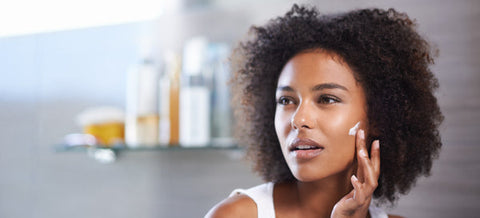
There are a wide variety of skin care products on the market today, some of which are synthetic, organic and some of which are natural. While all of these products have the potential to be beneficial – which should you use?
But before we get into the details, we’d have to first find out what these terms “natural’ and “organic” in skincare actually do mean?
Organic Skincare:
The term ‘organic’ refers to how an ingredient is farmed i.e., it must be prepared and grown without pesticides, chemical fertilizers, GMOs, sulphates/parabens or antibiotics.

From this definition you can tell how strict the regulations and guidelines are for a skincare product to be said to be organic. Making authentic organic creams is not chides play and most of the brands that label as organic especially in Nigeria are sadly not 100% organic and you’d get to know How to Tell If an Organic Skin Care Really Is Organic in a moment.
According to a Consultant Physician and Dermatologist at the Lagos State University Teaching Hospital, Ikeja, Dr. Folakemi Cole-Adeife “most organic creams in Nigeria contain bleaching ingredients, steroids, and high concentrations of hydroquinone that can cause irreversible skin damage”
According to the dermatologist, a major side effect of organic creams was recurrent skin infections, noting that many of the users of organic creams are having repeated skin infections under the breast, groin areas and armpits and these rashes may be itchy, slightly painful, and reddish.
What’s even more disturbing is that when you ask a lot of people who tend to have these kinds of rashes, they say they started using an organic cream but they’ve been using the cream for about six months so they don’t believe that the cream is responsible for these symptoms.
“Another common side effect also is stretch marks. When using cream and you begin to notice stretch marks that were not there previously, probably that cream contains a steroid according to Dr Folakemi.
Speaking in her ‘Skin Talk’ episode on her YouTube channel, the dermatologist said, “I’m seeing so many people with terrible side effects from using creams that they say they bought online. They claimed the creams are natural or organic but they are coming down with side effects of steroid abuse"
“A lot of these so-called organic creams are just filled with a lot of bleaching agents or steroids. Some have a very high concentration of hydroquinone that may be causing a lot of skin damage that may be irreversible.
Cole-Adeife noted that a lot of these organic products contain some ingredients that can burn the skin when you are exposed to the sun.
She added that “Initially, the organic creams would make your skin look nice if they contain tropical corticosteroids and you will find out that the skin will become smoother and glowing initially and that initial effect is what draws and attracts people to using these organic creams...
“And shortly, maybe in a few months after starting the use of these creams they begin to have things like thinning of the skin, they begin to notice that the skin is bruising and sometimes, the wounds don’t heal as fast as they should.
“And on the face, there may be increased hairiness. So, you have people having a lot more hair on their faces and above the lips, and the mustache area becomes quite hairy.
“In dermatology, this is called hypertrichosis and it’s a sign that there is long-term use of topical steroids. So, it is very important that you’re very careful with the kind of creams you use of their skin so you don’t end up with long term complications that may be difficult and very expensive to treat.
The meaning of certified organic
As a result of the controversy over the years on the use of ambiguous labelling by beauty companies. We can agree the word ‘organic’ in particular has been somewhat misrepresented, as it has been revealed that almost any company can have the word on their product, even if the actual ingredients are NOT organic or only a very tiny portion on the ingredients are organic. This is where yet another term - ‘certified organic’ - comes in.
Certified organic skincare products are those that have been certified as comprising organic ingredients by regulatory bodies such as Australian Certified Organic, or another from ECOCERT, BDIH, USDA, Biologique [an EU certification], and BIO [a German certification for organic products) who set a certain number of production rules for organic certification.
These stringent measures ensure that the consumer is aware of a brand’s credibility when it comes to organic skincare, and thus are able to purchase and safely consume products without any adverse side effects usually associated with pesticides and other toxic ingredients.
If you’re to use organic products, go for certified organic ones. But then the question arises – certified by who?
There is little or absolutely no regulations or guidelines governing the production of cosmetics and skincare in Nigeria and brands can float the word “Natural” and “Organic” without actually being 100% clean, safe and healthy.
Nafdac registrations won’t necessarily guarantee 100% the product is clean, but it’s a good starting point, here are other ways to know if a product is as organic as it claims to be:
How to Tell If Your Organic Skin Care Really Is Organic
-
Look for an organic seal.
The word organic can appear in different ways on products, but if you are really looking for a truly organic product, the USDA Organic seal is the only thing that speaks the truth. In order to display the trusted organic label, products must contain at least 95 percent organic ingredients. According to this Organic Certified Label Guide, the remaining 5 percent or less of products must not be available organic and be approved by the National Organic Program. Products that say “Made with Organic Ingredients” must have at least 70 percent organic ingredients, but they will not have the USDA seal. Some companies may use a combination of natural and synthetic ingredients, but if they contain less than 70 percent they can only include organic ingredients in the list of ingredients not as a label. However, most of this certification mentioned are obtainable overseas. For local brands, check out any certifications the product may have to help you make the best decision for your skin. if they have more, it’s a good sign.
-
The Price Of Organic Skin Care Will Be Higher
The organic label may come with an increase in price tag, but the price can be associated with a higher quality product that is therefore healthier than the cheaper alternatives. The labels aren’t a marketing ploy: companies have to follow painstaking guidelines that are as pricey as they are time-consuming. The application and fees for obtaining a USDA Organic seal can cost up to $1500 and beauty brands have to register each additional product they want to display the seal with additional cost. If the product is way too cheap, it’s probably chocked with fillers and chemicals.
-
Organic skin products have a shorter shelf life
Labeling may not be a financial burden for larger brands, but small batch or made-to-order beauty brands often have to price even higher to factor in that organic skin products have a shorter shelf-life. The cost of ingredients needed to formulate organic beauty products can be incredibly expensive. Questions you want ask is: “if this brand is truly organic then what preservatives are they using to keep products for long?” It most likely it won’t be organic preservatives and if it’s a synthethic or chemical preservatives it means the product is not organic. Think about your honey, melons, lettuce they all have life spans right? So too does organic products.
-
Ingredients Label
A truly organic brand would be more than proud to have their ingredients listed boldly on their packaging not just for transparency but because it’s going to help sell the products better by communicating why its unique. If you do not find a detailed ingredient lists on the packaging that’s an obvious sign.
-
The smell
if something is fresh and organic you don’t need a prophet to tell you, one way is how it smells. If a product is made with citrus then it should smell like citrus, if it’s made with beewax then it should smell like honey. If it smells so pungent, then it’s probably made of harsh stuffs.
-
Ask intelligent questions
Where do you source your ingredients from? What ingredients are in your product? What preservatives do you use? If they don’t engage you with meaningful answers or start beating around the bush or out rightly block you then move.
-
Packaging Matters!
Lastly, keep in mind that with natural ingredients, packaging really, really matters! Think of how long a head of lettuce lasts in your refrigerator and you'll get an idea of how the wrong type of packaging (such as jars or clear bottles) will cause natural ingredients to break down. This occurs from repeated exposure to light and air and contamination from repeatedly scooping out the product with your fingers. Be sure to look for opaque, non-jar packaging that minimizes exposure to these elements. Then you’ll be getting the most benefit from the natural, organic ingredients that can truly help you get (and keep) the skin you want.
IS NATURAL SKINCARE BETTER?
First, what’s natural skincare anyways.
Natural Skincare:
A product is considered "natural" when it contains ingredients that are sourced from nature rather than chemically produced in a lab. So natural skincare is one which Ingredients are derived from a living organism (Plants, animals) that can be found in nature.

I know you feel safer with the word “natural”, but you still have to be careful. Brands knows customers feel safer with natural and might want to exploit the term to cajole you into buying a product that claims natural but has absolutely nothing natural about it.
Because the same way anyone can put a label that their brand is organic is same way just anyone can claim to sell Natural products.
The point is something is natural or organic doesn’t mean it can’t damage your skin. The two most important things to focus on when considering a skincare brand to use are trust and quality.
Can I trust this brand? Are they certified? Certified by who? Where do they source their ingredients? Do they list their ingredients clearly?
What Goes On Your Skin Goes In Your Body

The products we are using on our bodies could affect our health. Our skin is our largest organ and will absorb almost everything you put onto it. The average person lathers and sprays 10 different beauty products onto their skin every day from roll ons to hair shampoos to perfumes to bathing soaps and the list goes on. Unknowingly exposing themselves to a wide range of unnecessary chemicals, which eventually make their way into our bloodstream.
The kind of harsh chemicals or organic creams you used when you were younger can’t be used anymore as you grow older because it poses way more health risk to you now. Your skin cells and body functions are not as active as they once were so you don’t want to feed your skin with a bunch of toxic chemicals that gets absorbed into the bloodstream through the skin pores.
What your skin needs especially if you're above 40 is a clean skincare completely safe, natural and healthy.
The other half of the equation is that our body also excretes toxins through the skin by sweating.
Unfortunately, most of common cosmetics and beauty products you see flying around on social media and cosmetics shops are not ethically made. Which means they can actually clog the pores, making it more difficult for this toxin-removal to take place. And with your skin being the largest organ, it’s not something we want to hamper.
The best way to clear any doubts about authenticity is to turn the bottles around and thoroughly read through the ingredients list.
Ingredients are usually listed in order of percentage from highest to lowest and if a brand is not transparent enough to list their ingredients on their label, then you might want to think it through before putting “unknown” substances on your skin.
But don’t freak out on reading the scientific names of natural ingredients like Squalane or Hyaluronic acid (a natural liquid produced by your own skin cells). If you’re confused, a little google research will clear things out.
Do not just buy off-label products. Any good product should have the labels, the contents, the ingredients, and the molecules in it should be written on it. It should have certifications.
And even when they do have labels, the most important factor when shopping for skin care is to find products with clinically proven ingredients in them — like retinol, for example. "When you look at skin care products, you don't want to get fooled by the razzle-dazzle of a good marketing campaign or a popular celebrity endorsement.
At the end of the day its about the highest possible quality skin care one can affordably get. Check out this post about understanding active ingredients and product labels properly so you know how to choose the right products for you.
If you are in pursuit of a healthy lifestyle and skincare, Consider Neutriherbs Natural and Healthy Skincare – Not just because the brand is better for your skin and health but also because it’s products are mild, effective and deliver on their promise.
How Neutriherbs is Revolutionizing Natural Skincare

-
Our Products Are Natural, Safe & Healthy
Neutriherbs Skincare is made from Nature (Plant extracts and biological raw materials) to enhance your natural beauty in every phase of life so you can feel and look your best.
-
Vegan and Cruelty Free Skincare
Our products are not tested in animals and manufactured abroad in a FDA Approved facility. So we are a Vegan and Cruelty free skincare brand.
-
Packed with Beneficial Nutrients
All of our products is packed with nutritious and beneficial natural ingredients like Vitamin C, Vitamin E, Hyaluronic Acid, Grapeseed Oil, Squalane that help to feed and nurture the skin without side effects.
-
Made For All Skin Types & Colors
One of the amazing thing about Neutriherbs formulation is that the products are easy, mild and gentle on the skin so can be beneficial for all skin types and colors without Irritation.
-
We Are Transparent We have nothing to hide
We show you, educate you and list for you ingredients used in making each product so you can be comfortable and get a bit intimate with the Nutritious products you feed your skin with.
-
Guaranteed Quality & Supply
Since we work directly with the Manufacturers your Neutriherbs Products Would Always Be available for you and at the highest quality. So you don’t have to worry about scarcity of the products at any time if you make the switch to Natural skincare today.
-
Top Global Skincare Certifications
We also sell our stuffs overseas and we have Top certificates like FDA, ISO, SGS, MSDS that ensures our products are made to US and European high quality cosmetics standards. You can check out our 5 star reviews on Amazon as well.



Comment
Am really impressed with your product, weldone!